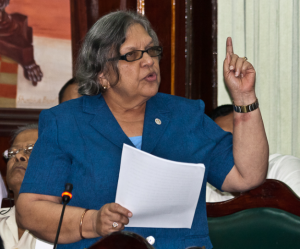– if necessary documents not submitted to broadcasting authority

Guyana National Broadcasting Authority (GNBA) Chairman Bibi Shaddick said there are currently only three broadcasting entities in the country that are licensed to operate from a list of nine broadcasters. The delinquent six, she said have outstanding application documents to submit before they can be considered in compliance with the Broadcasting Act, which governs the sector.
As such, broadcasting corporations that are yet to submit their documents to the GNBA in order to be licensed, have up until October 31 to do so.
“Under the law, when people are broadcasting without a licence, there are certain penalties and certain things that have to be done… and this is referred to people so that they understand that this would be put into place,” she stated.
Thus far, television entities that are in full compliance with the law and are licensed, include Television Guyana Inc, GWTV and Pinnacle Communications, and MTV, while licensed radio entities include Telcor and Cultural Broadcasting Inc and Radio Guyana Inc.
“The law says that the percentage for the broadcast fee is suppose to be a percentage set by the minister and a percentage of the gross revenue for the previous year, but we recognise that there is no way that any company could submit to us before September of a year, gross revenues for 2012, so what we used was 2011 instead of 2012,” she said.
Shaddick added that two of Guyana’s longest serving stations – WRHM and the National Communications Network (NCN) Inc, are among those with outstanding documents, and therefore non-compliant with the law.
Among the other noncompliant broadcasters are STVS, The Learning Channel, NTN, Rambarran Broadcasting Systems, Tarzie Transmission Service and New Guyana Company Limited.
According to Shaddick, both NCN radio and television are non-compliant.
She noted that the entity submitted everything except a notice of its board of directors.
Shaddick reiterated that non-submission of all documents would mean entities are not operating in accordance with the Broadcasting Act.
When the authority began operations in September 2012, letters were sent to approved broadcasters, giving them permission to continue broadcasting until all its arrangements and systems were in place. It then invited broadcasters to apply for new licences.
Shaddick pointed out that the authority has not received any applications from Region 10, but pointed out that there are currently 29 applications for new services.
Among the applications, seven are for television licence, 17 for radio, three for cable and two for Internet Protocol television (IPTV).
GNBA is tasked statutorily with licensing in the broadcast sector and ensuring compliance of broadcasters with the provisions of the Broadcast Act which was passed in 2011.



